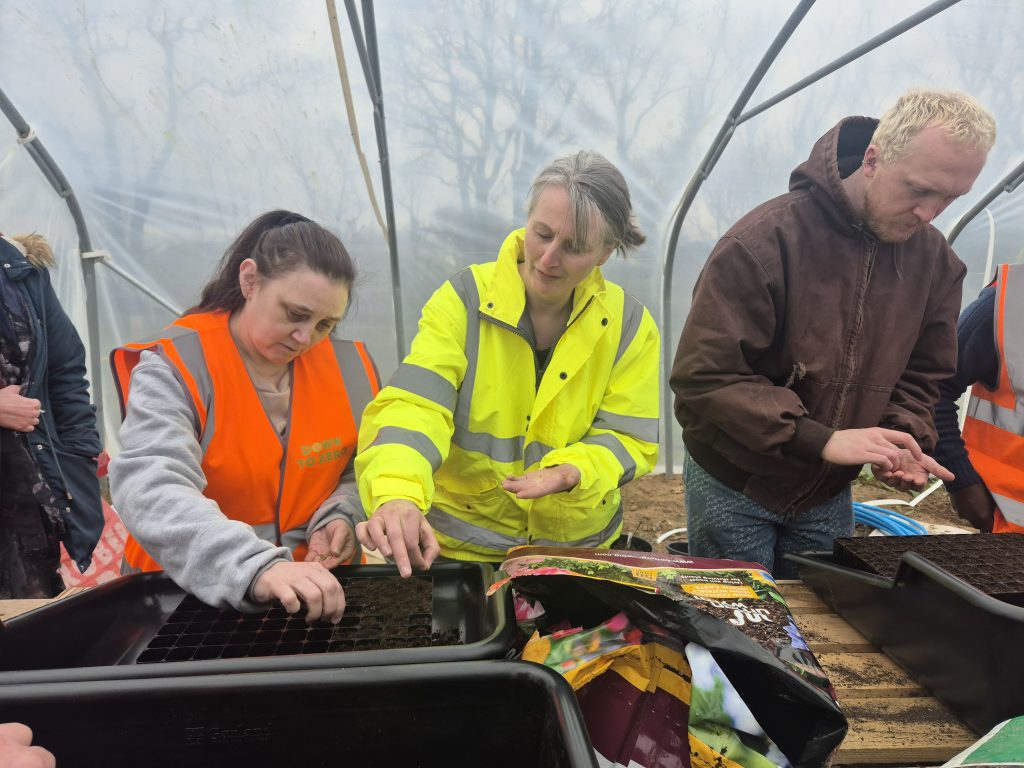POLICY DEVELOPMENTS IN OTHER PARTS OF THE UK
UK
Benefit cuts will hit Wales hardest
Cuts in disability benefits announced in the Spring Statement will hit hardest in Wales and will also have knock-on effects for housing benefit.
The changes to personal independence payment (PIP) and the incapacity element of universal credit will affect at least 800,000 current and future claimants who could lost between £4,200 and £6,300 a year.
Parliamentary constituencies with the highest proportion of the working age population in receipt of health-related benefits will be hardest hit and many of those are in Wales. First minister Eluned Morgan raised her concerns about the impact directly with Downing Street.
The cuts in themselves will put increased pressure on household budgets already squeezed by the welfare reforms of the 2010s and the renewed freeze in local housing allowance this year.
However, losing disability benefits could have further consequences for households as this could mean losing exemption from the overall benefit cap for people of working age and from restrictions on local housing allowance for the under-35s. Losing them could also trigger deductions from housing benefit of £93 a month for each non-dependent adult living with you.
England
Reeves hails OBR verdict on housebuilding
Planning changes introduced in England will help to deliver an extra 170,000 new homes across the UK by the end of the decade and boost economic growth, according to the Office for Budget Responsibility (OBR).
The forecast was a boost for chancellor Rachel Reeves as she delivered her Spring Statement, with the Treasury boasting that this would mean ‘bringing the UK one step closer to its Plan for Change mission to build 1.5 million homes’.
The OBR forecasts that there will be 1.3 million net additional homes across the UK by 2029/30 – but that will still mean missing the Labour manifesto target that in any case was only for England.
The chancellor also announced a £2 billion ‘downpayment’ on the next Affordable Homes Programme for England that will start in 2026/27. Total investment is due to be revealed in the spending review in June.
Scotland
Rent cap proposed to protect tenants
The Scottish Government set out plans for a new cap on private rent increases in rent control areas that it said would ‘provide important certainty for tenants’.
Amendments lodged to the Housing (Scotland) Bill would limit rent increases in control areas to CPI plus 1 per cent up to a maximum increase of 6 per cent. If approved, the rent cap would apply both to rent increases during the term of a tenancy, and in between tenancies, in areas where rent control is applied. Ministers will determine which areas should be subject to rent control.
Social justice secretary Shirley-Anne Somerville said: ‘Scotland already has some of the strongest rights in the UK for tenants, but we want to improve the renting experience even more to create an affordable, high-quality and fair rented sector.
‘We have been working closely with tenants’ organisations to develop provisions in the Housing Bill to improve renters’ rights, including a system of long-term rent controls that is fair for tenants and encourages investment in the sector.
‘Our rented sector is a crucial part of tackling the housing emergency and these measures provide important certainty for tenants.’
Northern Ireland
Programme for Government backs social housing
The Northern Ireland Executive pledged more subsidy for social housing as it set a target of starting work on at least 5,850 social homes by 2027.
The pledge was part of the Programme for Government 2024-2027 that also said the executive would seek Treasury approval on borrowing to enable the Northern Ireland Housing Executive to increase investment in its stock and contribute to new supply.
The programme also includes backing for shared ownership and housing support for vulnerable people and further reform of the private rented sector.
WELSH GOVERNMENT
New loans back affordable homes
 Housing secretary Jayne Bryant announced £90 million in low-interest loans to registered social landlords in Wales.
Housing secretary Jayne Bryant announced £90 million in low-interest loans to registered social landlords in Wales.
The loans will help the housing sector with the escalating costs of debt and support the delivery of 277 affordable homes, with 119 to be delivered this Senedd term, and improvement works to 4,397 existing homes.
Improvement works will help bring homes up to the Welsh Housing Quality Standard, making sure they are affordable to heat and fit for the future.
The low-cost loans range between £5 million and £10 million and highlight the Welsh Government’s continued commitment to achieving value for money and maximising all avenues to increase affordable housing supply.
The Welsh Government successfully introduced the loan scheme in 2023-24, issuing more than £75 million in loans to RSLs to bring forward over 450 additional homes in the social sector.
The minister met residents of homes delivered under the previous loans scheme on a visit to a development managed by Valleys to Coast in Llanharan in March.
Help to Stay Wales extended until 2026
Housing secretary Jayne Bryant announced that a scheme helping home owners at risk of repossession or homelessness to stay in their homes would be extended by another 12 months to March 2026.
Help to Stay Wales is available to eligible households who have explored all other measures offered by their mortgage provider and sought help through debt advice services.
Homeowners who are eligible will receive mortgage advice from specialist debt advisors, with the costs fully covered by the Welsh Government.
This will ensure the applicant has received independent advice as to the options available and confirm that all other avenues have been exhausted before offering a partial repayment of an existing mortgage balance via a low-cost equity loan reducing revised mortgage repayments to a level the applicant can afford.
Energy efficiency drive ‘will take more than a century’
Welsh Government’s energy efficiency rollout will not be completed until the year 2160 at the current rate of progress, said a Senedd Committee.
The Equality and Social Justice Committee’s inquiry heard evidence that Welsh Government investment in the Warm Homes programme is nowhere near what is required to tackle fuel poverty and that improving the energy efficiency of all fuel poor households in Wales would take over a century at the current rate.
While energy costs have risen to unprecedented levels, real-terms spending on the Warm Homes Programme, which includes schemes to install insulation and low carbon heating measures like solar panels, has remained broadly flat since 2021.
In its report, Turning up the Heat, the committee called for the Welsh Government to commit to ensuring that any additional funding that becomes available goes towards tackling fuel poverty.
Jenny Rathbone MS, chair of the Equality and Social Justice Committee, said: ‘The cost of energy from fossil fuels keep rising, which makes the need to tackle fuel poverty imperative. Frustratingly, this has not been reflected in the Welsh Government’s efforts, leaving a devastating impact on those who can least afford it. Instead we’ve seen a pattern of delays and missed deadlines.’
Written evidence to the committee highlighted the Welsh Government’s expectation that roughly 11,500 homes would receive adaptations over a seven-year period. At that pace work to reach all fuel poor households in Wales would not be completed until the year 2160.
The report recommends that the Welsh Government commits any additional funding, including any underspends or Barnet consequential arising from UK Government funding towards tackling fuel poverty in England, is invested in the Warm Homes Programme.
Regulation panel gets new chair
Ruth Glazzard was appointed as the chair of the new Housing Regulation Independent Assurance Panel.
The panel will provide an independent view on how effectively the regulatory framework for housing associations registered in Wales.
Ruth Glazzard is the chair of the Welsh Revenue Authority and holds a portfolio of non-executive roles, including as vice chair of Digital Health and Care Wales. She is a former board member of Coastal Housing and was a member of the board steering group overseeing Coastal’s recent merger with RHA.
The appointment is for three years from mid-February and is extendible for a further three-year period.
Consultations
Open consultations of interest to WHQ readers include:
New building control regime for higher-risk buildings and wider changes to the building regulations in Wales – responses by May 25
Changes to permitted development rights – responses by July 1
WALES
LHA freeze triggers rent shortfalls
Low-income private tenants in Wales face average shortfalls of £604 a year because of the renewed freeze in local housing allowance (LHA), warned Shelter Cymru ahead of the implementation of the decision by the Westminster government in April.
In some areas the gaps between rents and housing benefit are set to be even more severe, with a family in need of a four-bed home in Newport facing an annual shortfall of more than £3,000. While a family looking for a three-bed in Wrexham will need to find almost £900 on top of what they are eligible for.
Shelter Cymru said the freeze will significantly limit the financial assistance available to those grappling with high rental costs, pushing many into a position where they may be unable to pay their rent, resulting in increased risk of homelessness.
Chief executive Ruth Power said: ‘At Shelter Cymru we see the realities of a broken private rented sector every day, and 45 per cent of households coming to us for support are private renters. We know this decision will only make things worse and most likely add to the pressure on local authority homelessness services.’
Trivallis cuts patch sizes with new service
Trivallis launched a new community housing service based on a ‘team around the tenant’ approach in February. Inspired by the ideas in social care, the housing association says this is a first-of-its-kind initiative in Wales.
The new service focuses on building stronger connections between tenants and the housing team by offering more personalised, proactive and easy-to-access support. To make this happen, Trivallis is introducing smaller areas for staff to cover, increasing the size of its team and strengthening partnerships with community groups. The goal is to help tenants take care of their homes, well-being, and community relationships more effectively.
The new service features:
- More personalised support: community housing officers will oversee smaller areas (350 homes instead of 700), allowing them to build closer relationships and provide proactive help to tenants.
- Collaborative teams: staff across housing, safeguarding, lettings, and well-being now work together in local teams to deliver joined-up services.
- Seamless service: a new staff portal ensures smooth communication and faster resolution of tenant issues, from repairs to income support.
- Stronger community connections: partnerships with health, education, and local services will connect tenants to the right support when they need it.
- Proactive problem solving: early intervention will help address challenges like anti-social behaviour before they escalate.
It’s hoped the new approach will improve tenant satisfaction, reduce anti-social behaviour cases, and create stronger, healthier communities. For new tenants, extra support will help them settle in, connect with their neighbours, and feel at home in their community.
Trivallis chief executive Duncan Forbes said: ‘Our new Community Housing service is a game-changer for Trivallis. We’ve listened carefully to tenants and staff and recognised that our previous service model, with large patch sizes of 600-700 homes per housing officer, made it difficult to provide personal support. It often felt we were only there to fix problems, limiting our ability to truly work with tenants. It was clear we needed to change to better meet the needs of our tenants and communities.’
Hope for empty eyesore
A problem property that had been vacant for 15 years has a promising future as a new home, thanks to the efforts of Caerphilly County Borough Council’s empty homes team.
Since becoming vacant in 2009, the house in Nelson had become a magnet for anti-social behaviour, including break-ins and fires started at the property. Concerns from neighbouring residents led to the council being called to the property on numerous occasions.
Despite multiple notices being served by the council to secure the property and clear the gardens of overgrowth and waste, problems continued.
The empty homes team communicated with the owner and worked with them to successfully bring to the property to auction in November 2024.
RCT climate project wins national award

Down to Zero, a community benefit society that supports community-led environmental activities to tackle climate change, has scooped a National Community Management Award from Social Farms & Gardens, Wales.
The subsidiary of Cynon Taf Community Housing Group received the award for engaging and co-delivering solutions with local people on both climate change and local environmental challenges.
Down to Zero has three sites across Rhondda Cynon Taf: 1.6 acres in Pontyclun, 1.4 acres in Mountain Ash, and 27 acres of wetland and broadleaved native woodlands in Aberdare, which is leased to Cwmbach Community Wetlands Society.
The Pontyclun and Mountain Ash sites offer outdoor spaces for CTCHG tenants and community members to participate and volunteer in nature-based activities like planting community orchards, beekeeping, woodworking, and growing and harvesting food for its developing vegetable box subscription service, the Llysh Bocs.
Down to Zero was established in 2022 and is currently looking for volunteers to get involved across its Pontyclun and Mountain Ash sites.
Polish Village transformation underway
Work is starting on the redevelopment of Penrhos Polish Village on the Llŷn Peninsula. The Polish Housing Society transferred all current properties on the site to ClwydAlyn as part of a merger arrangement with a view to the redevelopment and regeneration of the community.
The former RAF air base was transformed into a residential village in the 1940s to accommodate Polish servicemen and women who stayed in the UK after World War II.
Phase one of the project will incorporate 44 energy-efficient, lifetime homes and was made possible thanks to an investment from a Welsh Government grant, following discussions between ClwydAlyn, Cyngor Gwynedd and Welsh Government.
Built using innovative designs and modern methods of construction, the new homes will be super energy efficient and benefit from air source heat pumps, solar electricity panels with storage batteries and electric car charging facilities.

Denbighshire Housing tenants are building a strong community at a newly finished Prestatyn housing development
Llys Llên tenants met their new neighbours and chatted to staff about their new homes at a welcome event at the former library site, Prestatyn.
The scheme is designed for people aged 55 and over. The development at the site has seen the creation of a total of 14 new, one-bedroom energy-efficient apartments which are situated in the building, along with two non-residential units on the ground floor.
10 PUBLICATIONS TO LOOK OUT FOR
1. Housing the economy
National Institute of Economic and Social Research and UK Collaborative Centre for Housing Evidence, February 2025
housingevidence.ac.uk/publications/housing-the-economy/
2. Turning up the heat before 2160: time to pick up the pace on tackling fuel poverty
Senedd Equality and Social Justice Committee, April 2025
laiddocuments.senedd.wales/cr-ld17121-en.pdf
3. Follow-up inquiry into the provision of sites for Gypsy, Roma and Travellers
Senedd Local Government and Housing Committee, February 2025
senedd.wales/media/uyfdjvh3/cr-ld17012-e.pdf
4. Systems-wide evaluation of homelessness and rough sleeping: preliminary findings
Ministry of Housing, Communities and Local Government, February 2025
5. What is a hostel in 21st century Britain?
Centre for Homelessness Impact, April 2025
www.homelessnessimpact.org/publication/what-is-a-hostel-in-21st-century-britain
6. Insights 2025 – housing crisis report
Understanding Society, February 2025
www.understandingsociety.ac.uk/news/2025/02/26/understanding-society-research-housing-crisis/
7. Heritage and home, investigating ethnic inequalities in housing affordability
Resolution Foundation, February 2025
www.resolutionfoundation.org/publications/heritage-and-home/
8. A blueprint for warmer homes – how to deliver a retrofit revolution
New Economics Foundation, February 2025
neweconomics.org/uploads/files/NEF_Great-Home-Upgrade_R1.pdf
9. Turning up the heat: nine discussion questions on overheating in domestic homes in the UK
UK Collaborative Centre for Housing Evidence, March 2025
10. Community-led place stewardship
Community Land Trust Network, January 2025